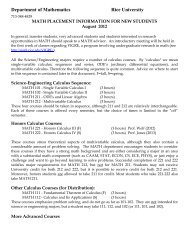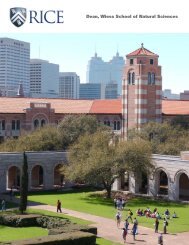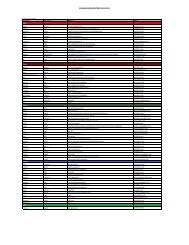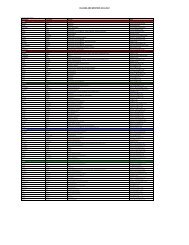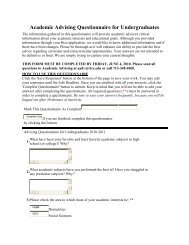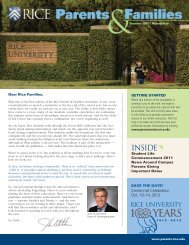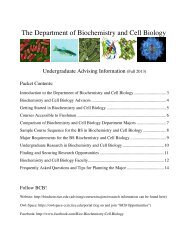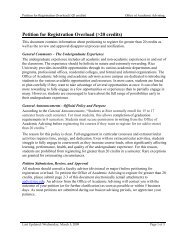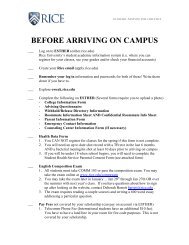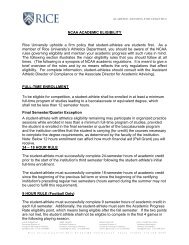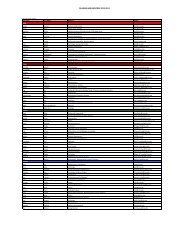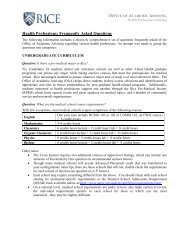GCE Advanced Level - Rice University
GCE Advanced Level - Rice University
GCE Advanced Level - Rice University
Create successful ePaper yourself
Turn your PDF publications into a flip-book with our unique Google optimized e-Paper software.
<strong>GCE</strong> <strong>Advanced</strong> <strong>Level</strong> 2<br />
frequently demand that applicants achieve a minimum set of grades in A level examinations, or the equivalent in<br />
other examination systems, before accepting them. While the government has rejected plans to introduce an English<br />
Baccalaureate [6] modelled on the International Baccalaureate, it has introduced a Welsh Baccalaureate studies in<br />
Wales, based on the French Baccalaureate; but it has yet to be introduced in the rest of the United Kingdom despite<br />
favourable comments by the Welsh Assembly to the British Government.<br />
Studying A levels<br />
The number of A level exams taken by students can vary, though generally not in the state sector in which around<br />
90% of students are educated. A typical route is to study four subjects at AS-level and then drop down to three at A2<br />
level, although some students continue with their fourth subject. Three is usually the minimum number of A levels<br />
required for university entrance, with some universities specifying the need for a fourth AS subject. There is no limit<br />
on the number of A levels one can study (except in Singapore, where students are restricted to 12 "academic units"<br />
and private candidates are also limited in their number of subjects. However, Singapore takes an alternate version of<br />
the A levels that is comparatively more difficult than the international standard.), some students do obtain five or<br />
more A levels. It is permissible to take A levels in languages one already speaks fluently, or courses with<br />
overlapping content. General Studies and Critical Thinking, which require a grasp of basic political ideas and current<br />
affairs in order to write essays rather than specific learning, sometimes augment a student's batch of qualifications.<br />
While many universities do not consider an A level in General Studies to be a stand-alone subject (and thus is not<br />
accepted as part of an offer), it may affect the offer which a student receives. For example, a student of Mathematics,<br />
Physics and Computing might receive an offer of B-B-C for a Physics degree, whereas one also taking General<br />
Studies might receive B-C-C. Unlike A level General Studies, Critical Thinking, which aims to improve student's<br />
analytical skills, has generally received a more positive reception from universities. Often it is given a UCAS tariff<br />
score unlike General Studies and some <strong>University</strong> admissions tutors see it is an advantage when applying for<br />
competitive courses. [7]<br />
The A level has been criticised for providing less breadth since many A level students do not generally study more<br />
than 3 subjects in their final year. [8] A major part of this criticism is that, while a 3 or 4 subject curriculum can be<br />
balanced across the spectrum (e.g., students may choose one science subject, a language subject, and a "creative"<br />
subject like Music), in many cases students choose three closely-linked subjects, for instance, Mathematics, Physics<br />
and Chemistry or Sociology, Psychology and Politics. This is in part due to university entrance requirements, which,<br />
for degree programs such as medicine, may require three related A level subjects. Thus, while the purpose of<br />
Curriculum 2000 was to encourage students to undertake contrasting subjects, to broaden their 'skill-base', there is a<br />
tendency to pursue similar disciplines. However, others disagree, arguing that the additional AS-level(s) studied<br />
would already have provided more breadth compared with the old system. The A levels' breadth also pale in<br />
comparison to the International Baccalaureate, which examines in six subjects, or the European Baccalaureate, which<br />
examines in at least 10 subjects.<br />
Curriculum 2000<br />
Following the introduction of Curriculum 2000 in September 2000 (with the first AS-level examinations held in<br />
Summer 2001 and A2 examinations the following year), an A level now consists of six modules studied over two<br />
years. Normally, three modules are assessed at the end of the first year, and make up a stand-alone qualification<br />
called the "AS-level" (or <strong>Advanced</strong> Subsidiary level, not to be confused with an older AS-level, the <strong>Advanced</strong><br />
Supplementary level). Another three modules are assessed at the end of the second year, which make up the "A2".<br />
A2 modules do not form a qualification in their own right; the satisfactory completion of the AS and A2 modules in<br />
the same subject is required to constitute a complete A level. Modules are assessed by exam papers marked by<br />
national organisations and internally-assessed coursework.



